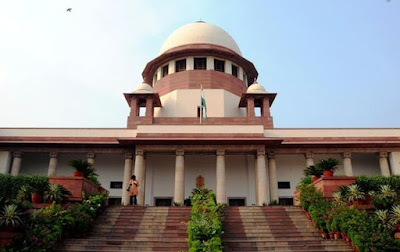 |
| India's Supreme Court |
In the wake of the debate over the death penalty following the execution of Mumbai attack convict Yakub Memon, the Supreme Court has said capital punishment is not inhuman or barbaric and will not violate the right to life and liberty in heinous crimes.
The observation came on Friday from a three-judge bench which was hearing the appeal from a murder case convict who has been given the death sentence.
Vikram Singh, who had been convicted for abducting and killing a 16-year-old, had challenged his death sentence, arguing that capital punishment is applicable only to terrorists.
The bench of Justices TS Thakur, RK Agrawal and AK Goel said, "A sentence of death in a case of murder may be rare, but if the courts have found it is the only sentence that can be awarded, it is difficult to revisit that question..."
What was important, the top court said, was that the punishment should be should be proportionate to the crime.
"Death penalty in a case of kidnapping or abduction will not qualify to be described as barbaric or inhuman so as to infringe the right to life guaranteed under Article 21 of the Constitution," the court said.
While death penalty is awarded in the rarest of the rare cases, the last few persons to be executed were people convicted on terror charges - Afzal Guru, who was convicted in the 2001 Parliament attack case and Ajamal Kasab, the lone Pakistani terrorist caught for the 26/11 attacks in Mumbai.
But it was Yakub Memon's execution that not only triggered questions from the civil society about his punishment, but also on the larger debate on death penalty.
Vikram Singh had been arrested for the abduction and murder of school student Abhi Verma in 2005.
He was awarded the death sentence by the Punjab and Haryana High Court, which was later confirmed by the Supreme Court. He had challenged the death sentence given for the crime he was booked under - kidnapping for ransom (Section 364A).
Punishments under the section include death sentence, life imprisonment and a fine.
Source: NDTV, August 23, 2015










